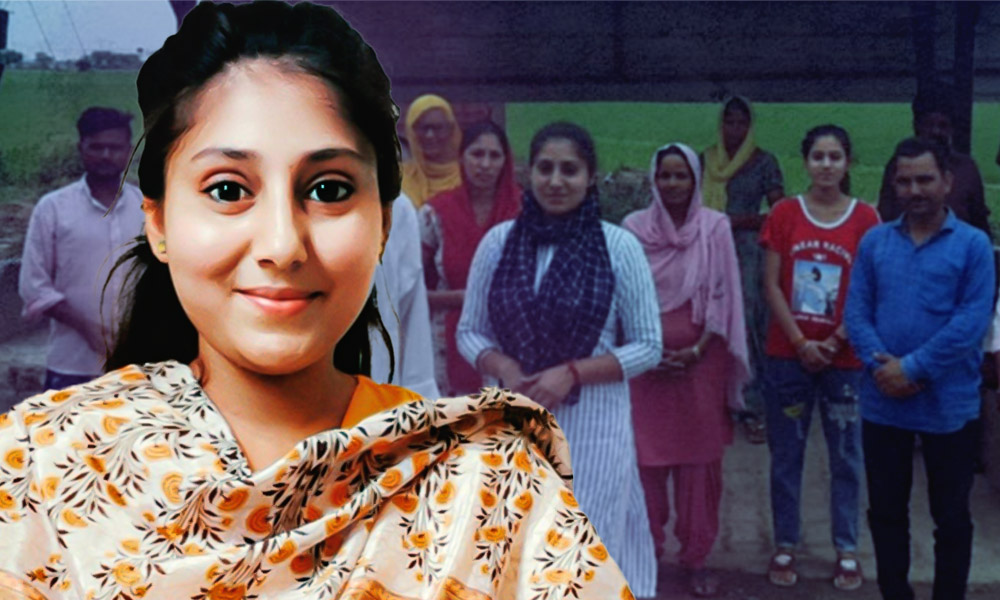
'Gaon Ki Seva Ka Mauka Tha': Haryana's Youngest Sarpanch Parveen Kaur
Haryana, 15 Sep 2020 10:54 AM GMT | Updated 15 Sep 2020 10:59 AM GMT
Editor : Shubhendu Deshmukh |
Shubhendu, the quint essential news junky, the man who loves science and politics in equal measure and offers the complete contrast to it by being a fan of urdu poetry as well.
Creatives : Rajath
A free spirit who find meaning in life with the virtue of creativity and doing job par its excellence, animal lover and traveller by heart.
Parveen is the youngest Sarpanch in Haryana who has worked towards addressing several challenges on the grassroots level.
Four years ago, ahead of the 2016 Panchayat elections, the Haryana government amid much criticism passed a bill to amend the Panchayat law in an attempt to protect the grassroots democracy and mandated 'minimum' education criteria to contest Panchayat elections in the state.
The 'minimum' education requirement for women candidates from the general category to stand eligible for the panchayat elections is the completion of Class 8 and completion of Class 5 for women candidates from Scheduled Caste.
With this amendment and a unanimous decision of the voters, 21-year-old Parveen Kaur, in 2016, became the youngest sarpanch of Kakrala-Kuchia which is located in Kaithal district of Haryana.
"My family had moved to the city in 2005 because of the lack of resources in the village. I was pursuing my Bachelor's degree in Technology and wanted to be an engineer. But we were always closely connected with the village which is home to over 1,200 people. When the laws were passed, the post for sarpanch was reserved for a female candidate. Initially, I was hesitant in taking up the responsibility because I wanted to study and was unsure about how I would balance things. But the villagers approached my father and instilled confidence in me, and then it was a matter of trust and taking up the challenge," Parveen tells The Logical Indian.
She along with her father and the villagers mulled on the ways which would not compromise any aspect of their lives and figured that she would continue her studies during the weekdays and would visit the village on weekends.
"My family especially my father has played an important role in the entire process. It has been over four years since I was chosen to shoulder the responsibility as the sarpanch and I have been able to overcome the roadblocks because of their support. My father has been voluntarily participating in every activity. Whether it was attending the training sessions for the role or to attend meetings, I was able to perform my duties and manage my classes," says Parveen.
Talking about addressing the challenges faced by the villagers, Parveen says, "After speaking to the villagers and inspecting the facilities provided by the government, water scarcity emerged as the biggest issue. I diverted my attention to solving the immediate concern because people had to walk miles to fetch water, so, water coolers were set up in several areas."
"Steps were taken to ensure the safety of women in the villages, street lights were set up which were powered by solar panels. We started building the resources on sustainability models. CCTV cameras were installed too."
Later, investment was made for the construction of Panchayat Ghar to enable the Panchayat members to meet regularly and discuss on community problem-solving. It was important for me to bring a change in the perception that the village's youth have towards education, so the Panchayat Ghar was also equipped with a library.
"My sister and I had also taken up the responsibility of teaching the children who visited the library and on certain occasions," Parveen says.
"Also, to promote the idea of a clean neighbourhood, dustbins were provided and clogged sewer lines were cleaned and drains were covered. I had the opportunity to interact with the villagers, to lend an ear, understand their problems and then work towards solving them," says the sarpanch.
She also explained that the Panchayat worked tirelessly to address the problems faced by the villagers. This was to maintain peace within the community and to instil a sense of faith in the villagers.
Parveen also tells The Logical Indian that the children in her villages know how to speak in Sanskrit. She feels proud to see young kids embracing the country's traditional customs in today's times. She also shares that in February, the Chancellor of Maharishi Valmiki Sanskrit University visited the village and expressed their interest in turning it to a "Sanskrit village".
"I had been planning to set-up waste-material recycling units that would offer employment opportunities to the villagers and also aid in revenue generation. However, there is a shortage of land to set up these units, we have been working on several options including utilising the dried cow dung, plastic waste and other reusable materials," she added.
"Lack of infrastructure had been the biggest obstacle and it was a challenge to resolve each and every problem with limited resources, however, education has always been on the forefront of choices for me. So, when I witnessed the children in the village standing under the scorching sun for hours waiting for their school buses, I decided to invest in the construction of bus stops with shades. There's just one school for two-three villages, constructing more schools is my priority so that the children don't have to wait hours travelling back and forth," shares Parveen.
When asked about how the coronavirus pandemic has impacted the village, Parveen explains that during the initial months of the outbreak people were educated on what the virus was and how its transmission took place.
The villagers were made aware regarding the use of masks, sanitisers and Parveen along with the other authorities conducted distribution drives amongst the villagers. She said that this helped in keeping the villagers alert and from contracting the disease.
"Gaon ki seva karne ka mauka milega, ise badi baat aur kya ho sakti hai. Paanch saal baad job kar lena (What could be a bigger opportunity than serving the people? You can get a job after five years too!) my father had told me and this has stayed with me since then. Now there are at least 1,200 people looking up to me, to listen to them and take their responsibility," she said.
Talking about her biggest learning in these four years, Parveen says, "It has made me more confident as a woman. Politics is not a child's play, one has to learn to deal with different kinds of people and this role has helped me grow. You have to be careful when you are the decision-maker and when your choices affect the lives of others. My education has helped me throughout. I am attending classes for web-designing and want to create a digital portal for my village, that would be the stepping stone to digitise their lives."
On September 11, Haryana's Chief Minister Manohar Lal Khattar tweeted in praise of the youngest woman sarpanch of the state stating that the daughters of Haryana have incredible strength, determination and passion to achieve their goals through their voice and actions.
 All section
All section














